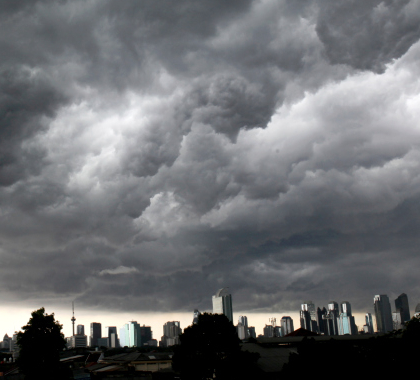Editor’s Note: First-term New Jersey state Assemblyman Hal Wirths (R-Hardyston Township) serves on the Appropriations and Labor committees and on the Telecommunications and Utilities Committee. Before being elected to the state Assembly, Wirths served on the New Jersey Parole Board, as a Commissioner of the N.J. Department of Labor and Workforce Development, on the N.J. Ethics Commission, and as a member of the N.J. Economic Development Authority.
Burnett: New Jersey recently enacted what has been referred to as a “rain tax.” What is that, and why did you oppose it?
Wirths: The rain tax allows counties or municipalities to collect fees to pay for managing storm water or for them to set up a utility authority that can impose fees on owners of properties with large areas of impervious cover, such as parking lots and rooftops of malls, apartments, and commercial developments. There is no cap on the tax, so there is no stopping it from rising over time. Different cities and counties can set up their tax or taxing authorities differently.
Every major study ranks New Jersey as having the highest property taxes, worst overall tax climate, and as being one of the least affordable states to live in and start a business in, which is why former Gov. Chris Christie vetoed a similar bill when he was in power and why I, coming from a business background, got fired up and vocally opposed the creation of the rain tax.
The same day the Democrats passed the rain tax, they also passed a property tax hike to fund arts and culture; they hiked the state’s minimum wage, which will also almost certainly result in an increase in property taxes—already the highest in the nation—since the increase applies to workers for the state, for counties, municipalities, and school districts; imposed fee increases for paperwork at the County Clerk’s office; and instituted a tax on parking tickets, a hike in payroll taxes, and a tax on jet fuel which will cause prices of airline tickets to rise.
I opposed the rain tax and the other taxes because the flood of taxes is just never-ending here in Trenton.
Burnett: As I’m sure you are aware, regulations act as hidden taxes, and New Jersey has one of the highest regulatory burdens in the nation. What steps should the legislature take to change that?
Wirths: New Jersey is a regulatory hellhole. I served in Gov. Christie’s cabinet, and I am proud to say that in his eight years in office we most likely had the least amount of new administrative rules of any modern-day gubernatorial administration. He established the Red Tape Review Committee headed by the lieutenant governor, which took testimony from individuals, business owners, and government officials and led to legislative reforms enacted during his tenure.
Under Gov. [Phil] Murphy, this committee was allowed to lapse, and regulations are expanding once again, which is why I am cosponsoring legislation to make the Red Tape Review Committee permanent.
Burnett: New Jersey Sen, Cory Booker (D), a candidate for the Democratic nomination for president, has thrown his support behind the Green New Deal, which would require ending the use of fossil fuels, encourages getting rid of cows and stopping meat eating, and would require the federal government to reshape the entire economy radically, all in just 10 years. What are your thoughts on that proposal?
Wirths: I am not giving up my burgers, I can tell you that! The Green New Deal is all about the federal government taking control over the entire economy and our daily lives, period. It’s not really green; more like Soviet red.
It is one of the worst legislative initiatives ever proposed in Congress. America was founded on liberty and freedom, and the Green New Deal runs contrary to everything our country is about.
We didn’t win the Cold War to turn America into Venezuela, and whatever I can do not only as an elected official but as an American to defeat this Green New Deal permanently, I will.
Burnett: Previous Gov. Chris Christie withdrew New Jersey from the Regional Greenhouse Gas Initiative (RGGI) under which northeastern states charge fees for permission to emit carbon dioxide. Murphy is taking steps to force New Jersey to rejoin RGGI, and electric power rates have subsequently risen. What are your thoughts on Murphy’s decision to rejoin RGGI?
Wirths: I wholeheartedly supported Gov. Christie’s 2011 decision to pull New Jersey out of RGGI. Unfortunately, legislation which I support to permanently withdraw New Jersey from RGGI was never acted upon.
Now Gov. Murphy has announced the New Jersey Department of Environmental Protection (DEP) is issuing rules to force New Jersey to participate in RGGI once again.
Gov. Murphy and the Democrats, despite my opposition, have enacted a number of bills which will lead to increases in the price of electricity for New Jersey ratepayers in order to subsidize “clean energy.”
For instance, A3723 establishes new and modifies existing state clean energy and energy efficiency programs and modifies New Jersey’s solar renewable energy portfolio standards; S1217 requires New Jersey’s Board of Public Utilities to consider and approve an amended application for a qualified wind energy project offshore in certain N.J. territorial waters; and S598 requires New Jersey to join the U.S. Climate Alliance to uphold the Paris Climate Accord, which President Donald Trump wisely is withdrawing the nation from.
H. Sterling Burnett, Ph.D. ([email protected]) is a research fellow at The Heartland Institute.
Official Connection
State Assemblyman Hal Wirths (R-Hardyston Township): https://www.njleg.state.nj.us/members/BIO.asp?Leg=402





